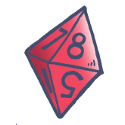Episode 129: How to Alert the Occult Police
February 27th, 2015 | Robin
 We start with an Ask Ken and Robin question from Ethan Cordray, who wants to know how a GM and player might collaborate in creating scenarios.
We start with an Ask Ken and Robin question from Ethan Cordray, who wants to know how a GM and player might collaborate in creating scenarios.
Inspired by this Malcolm Gladwell piece, the Crime Blotter examines the changing relationship between organized crime and upward mobility.
Fun with Science plays with your perceptions for a look at hallucinations and synaesthesia. Recommended reading: Oliver Sacks’ Hallucinations.
Speaking of reading, we conclude with another paw through Ken’s Bookshelf, this one cataloguing the haul from his recent jaunt to San Francisco.
Attention, class! Anchor sponsor Atlas Games wants to enroll you in Mad Scientist University, the card game of evil genius, insane assignments, and unstable elements. Act now, Ken and Robin listeners, and they’ll throw in the Spring Break expansion set for free. Shipping within the US is also free.

This episode is also brought to you by the Plot Points podcast. After you listen to us, listen to them analyze RPG adventures as literature.
Modern Myths wants you to know about its booth, a veritable oasis of roleplaying both indie and trad, at PAX East, right across from Indie Games on Demand.
Podcast: Play in new window | Download

















The mention of John Dee made me think of Enochian, which led to wondering if you have any interesting thoughts about the use of magical languages in RPGs.
Ken’s Frisco book haul
The Haunted Pampero: Unpublished Mysteries and Fantasies, William Hope Hodgson (Borderlands Books)
Terrors of the Sea: Unpublished Fantasies, William Hope Hodgson (Borderlands Books)
Shakespeare and the Goddess of Complete Being, by Ted Hughes
The Crown: A Tale of Sir Gawein and King Arthur’s Court, by Heinrich von dem Türlin
Real Canadian Pirates: Buccaneers and Rogues of the North, by Geordie Telfer
Black Fire: The True Story of the Original Tom Sawyer — and of the Mysterious Fires That Baptized Gold-Rush Era San Francisco, by Robert Graysmith
Storm and Conquest: The Clash of Empires in the Eastern Seas, 1809, by Stephen Taylor
Edward Lansdale’s Cold War, by Jonathan Nashel
Mammy Pleasant, by Helen Holdredge
Forgotten Kingdoms in Sumatra, by F.M. Schnitger
Neverland: J.M. Barrie, the Du Mauriers, and the Dark Side of Peter Pan, by Piers Dudgeon
The Search for Lost America: The Mysteries of the Stone Ruins, by Salvatore Michael Trento
The Goetia: The Lesser Key of Solomon the King, translated by Samuel Liddell MacGregor Mathers and edited by Aleister Crowley
Enochian Vision Magick: An Introduction and Practical Guide to the Magick of Dr. John Dee and Edward Kelley, by Lon Milo DuQuette (Fields)
The Story of Dion Fortune, as told to Charles Fielding and Carr Collins (Fields)
Crossed Keys: The Black Dragon + The Enchiridion of Pope Leo III, trans. & ed. by Michael Cecchetelli (Fields)
By the way, Ken, why DID Time Inc. decide to make you keep the young Napoleon from sailing off on the doomed La Perouse expedition?
Synaesthesia is used to excellent effect in Jason Morningstar’s “The Black Drop” adventure for Trail of Cthulhu. After reading through it, I found myself wondering why synaesthesia had not been used more often when in contact with mythos entities.
I don’t think it was called out as synaesthesia, exactly, but the d20 Call of Cthulhu book mentioned the idea of crossing senses when losing sanity as well.
One of my favourite grimoires is the Black Pullet.
http://en.wikipedia.org/wiki/Black_Pullet
Someone pulls out his Red Dragon [grimoire], and pull out my Black Chicken [grimoire].
The Book of the Smoke is a great in-game artifact sandbox game generator that I often use in my games of Trail of Cthulhu.
I’m going to nominate a “Ask Ken and Robin” segment here:
Do either of you think it’s possible to include religious faith into a Lovecraftian/Cosmic Horror game without treating it as fundamentally and totally false?
I’ve played in a couple of games where players make characters defined by their religion such as priests and nuns, and mid-game it started to become clear that everybody’s perspective on their faith and any power it held in-game were conflicting on a fundamental level. The players wanted to treat their faith as genuine source of mental, spiritual, or even potentially physical empowerment in face of the Mythos (but not necessarily treating their faith as a greater metaphysical truth), but some GM’s and other players saw this as a violation of the basic premise of a CoC game. So do you think they’re right? Is Lovecraft’s materialist-atheist philosophy part and parcel of maintaining the integrity of a Mythos universe? Or is there some potential compromise here?
Thanks for the answer, guys! I thought it might be a bit of a stumper; after all, I asked you because I couldn’t think of a very good answer myself! You’ve given me lots of good ideas to think about. I particularly like the idea of having one of us play an “insider” character with extra knowledge of the setting or initial scenario. I could see that working very well in a heist or spy-agency game. It would be pretty cool, for example, to have a player be the one who unfurls the blueprints and explains the security system of a targeted facility, since he or she used to work there.
For my Call of Cthulhu/Trail of Cthulhu games, I suppose I’ll probably be better off just doing what I’ve done so far, and making sure my wife plays in an early playtest so we can talk it over afterward. 🙂
As a player, I’ve replayed an entire scenario, with a new group and a different gm.
As a gm, I’ve designed a scenario with the aid of a player in the group.
In the co-written scenario, the player knew about 50% of the story in advance. For the rest, he was as much in the dark as the rest of the group.
In the scenario that I replayed, I knew just about everything in advance, but still had a great time.
In both instances, the player that was in know acted as co-gm.
In sensitive scenes, he’d step in and carefully nudge the other players along, while at other times he’d hang back to let the others make all the decisions.
Most of the time, he just played along as usual.
With the co-gm not having to improvise everything, the potential for memorable role-playing increased.
Also, knowing when a big plot twist was up, so you could watch the other players reaction, was really fun.
One footnote to Storm and Conquest: The Indian Ocean campaign is the backdrop to one of Patrick O’Brian’s Aubery/Maturin novels, The Mauritius Command.
If you’re interested in the period and you’ve not read the books then they’re well worth a try.
[…] Ken and Robin Talk About Stuff #129 The Crooked Ladder […]